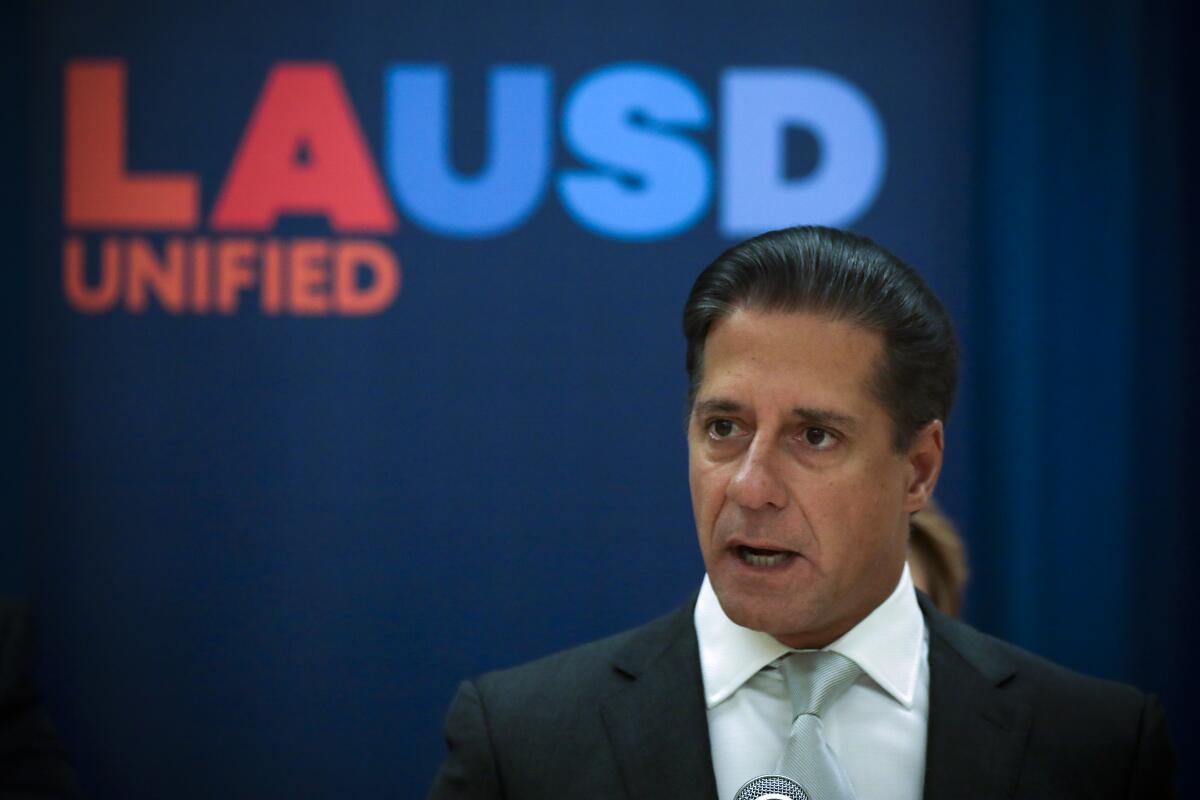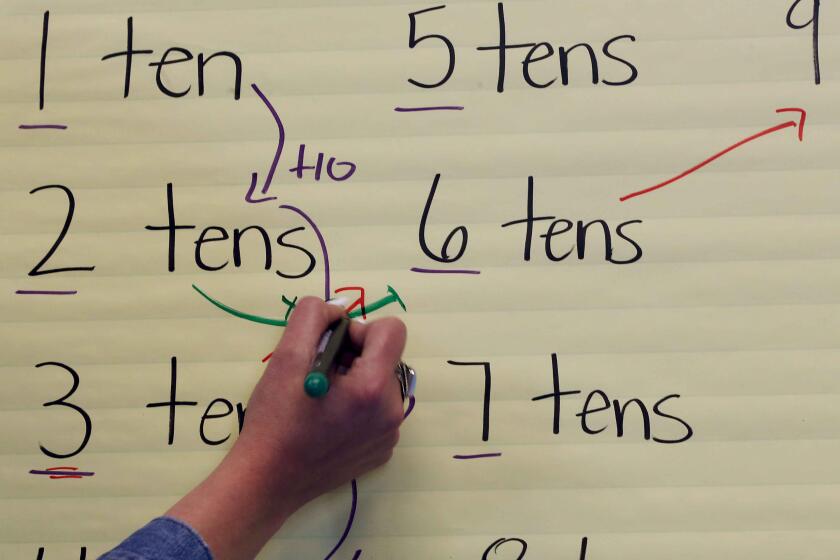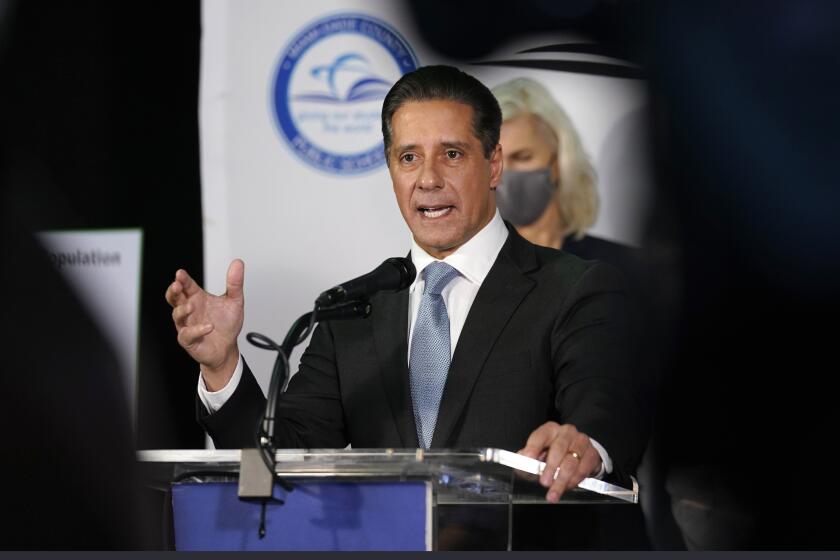Carvalho says replacing Primary Promise will do more for students at much lower cost

- Share via
Los Angeles Unified School District Supt. Alberto Carvalho on Tuesday outlined a shift to a key educational intervention program that will expand its focus beyond helping elementary students who are struggling with reading and math to reaching older students and strengthening the skills of teachers.
Carvalho and his senior staff detailed the plan in public for the first time after facing criticism for quietly beginning to dismantle the flagship initiative of his predecessor, Austin Beutner, earlier this year.
That program, known as Primary Promise, had been lauded by district officials as recently as 14 months ago.
Board member Nick Melvoin said at Tuesday’s school board meeting that the public could not be blamed for feeling “whiplash” over a program that was first touted, then criticized.
Board member Kelly Gonez said she has seen Primary Promise work effectively at schools and pressed senior officials for specifics on staffing levels under the new academic framework.
Administrators found themselves making the difficult point that they are expanding services but cutting costs at the same time.
They noted that the revamped approach, known as the Literacy and Numeracy Intervention Model, will reach middle school students instead of stopping at third grade. They ultimately acknowledged that fewer elementary schools would have intervention services but insisted that overall services to students of all ages would improve.
Officials set the cost of next year’s effort at about $100 million, compared with $134 million this year and about $200 million if Beutner’s plan to reach every elementary school with Primary Promise had been carried out. The new plan also will rely on training classroom instructors in methods the intervention specialists have used.
Carvalho said he had to find some way to cut costs to preserve such services.
The district has to deal with about 2,100 full-time positions, including those in Primary Promise, that will no longer be funded by September 2024 because state and federal pandemic relief funds must be spent by that time and won’t be renewed. Officials said they can make the transition without layoffs but not without pain. Employees may have to shift to new jobs and new schools.
The funding problem is real, Carvalho said: “Pulling the rabbit out of the hat will not work. The rabbit is dead, and the hat is small.”
Primary Promise has relied on specially trained teachers and aides to provide daily instruction to small groups of students in kindergarten through third grade who were behind in reading, math or both. Their progress was monitored every two to three weeks, with instruction adjusted accordingly.
Such efforts — at L.A. Unified and elsewhere — fall under the general heading of “intervention services.” One element that distinguished L.A. Unified’s program was its large scale — a direct response to academic setbacks after campuses were closed for more than a year during the COVID-19 pandemic.
L.A. Unified officials need to explain to parents why they slashed Primary Promise, a program that has helped struggling students improve their reading and math achievement.
Primary Promise was achieving extraordinary results, in the estimation of district officials, who presented a public progress report about 14 months ago. Since then — with the arrival of Carvalho — a district position has emerged that Primary Promise was less effective than advertised, not especially groundbreaking and too expensive to sustain.
Concerned parties on both sides of the debate lined up for a public showdown.
More than 1,700 signed a petition in support of Primary Promise.
“The LAUSD has plenty of programs that don’t work, so we, a coalition of parents, teachers, staff and community members, are asking the board to stop Supt. Carvalho from unilaterally dismantling this program that does in fact work, in order to enact a lesser version,” the petition says.
Parents offered testimonials in favor of Primary Promise.
“I have a seventh grader who while in elementary school was part of this amazing program, and without this program, I know for sure he would not be thriving as he is today,” Maria Morgan said.
Coming forward on the other side was a coalition of community groups who argued that Carvalho deserved the benefit of the doubt in his efforts to carry out — and be accountable for — his multiyear strategic plan.
“Primary Promise was responsive to a moment in time, but now we have a Board-adopted strategic plan aligned with the Board’s vision and goals,” a letter from the coalition said. “To fully realize the promise of the district’s Ready for the World Strategic Plan, we must be nimble to changes that align to and actualize the plan.”
Groups that signed the letter included InnerCity Struggle, Para Los Niños and Partnership for Los Angeles Schools.
In an interview, Primary Promise teacher Steve Braudo said the program’s demise represents one more instance of the school district lurching in a new direction without a thorough evaluation.
Officials acknowledged that an evaluation of Primary Promise is not due until the end of July.
“The reality is that we can’t wait,” L.A. Unified Chief Strategy Officer Veronica Arreguin said. “We can’t wait for any type of results right now. We need to be able to be ever-changing and supportive as to best practices that we know exist, not only in L.A. Unified but across the nation, that actually have instructional impacts.” She added that “we’ve seen that through research” elsewhere.
Carvalho’s message on Primary Promise — to the extent that he has talked about it at all — has varied, but it’s clear he was never won over by the program.
In an August interview, he said there was nothing original about Primary Promise, although such intervention strategies are a sound, if limited, practice. In a May 9 memo to the school board, he challenged the effectiveness of the effort: “There is limited data supporting that the current approach has achieved the results as envisioned.”
In an address Friday, he said there was nothing remarkable about progress that occurs through such efforts.
“I can assign any one of you four kids — even if you have no formal training in [teaching] reading — and if you spend 40 minutes with four kids — with no training in [teaching] reading — at the end of three months, those kids will read better,” Carvalho said.
Education research has documented that “anything you do with kids will provide some degree of improvement,” he added.
On Tuesday, he modified his emphasis.
“Of course it works,” he said. “And I’m here to tell you it works because it has worked across the country over the past four decades.”
Where he has been consistent is in asserting that the district could not afford to sustain Primary Promise.
Intervention efforts will require new funding sources, Carvalho said, which are available but limited.
Alberto Carvalho has led Miami-Dade County Public Schools, the nation’s fourth-largest district, since 2008.
Under his plan, significantly fewer elementary schools will have intervention services, but such help will be expanded to reach middle schools, and the district is working with schools to use discretionary funds to purchase intervention.
Officials asserted that the district has to transition out of intervention as a fundamental strategy. In an interview, Carvalho likened it to a hospital relying on an inefficient emergency room for public health. The district instead will focus on more effective teaching by classroom instructors. There will still be intervention services for the schools most in need, he noted.
Critics were not mollified.
High school teacher and parent activist Nicolle Fefferman said the cuts should have come from programs that aren’t as effective.
“The point of Primary Promise is to eliminate the need for later intervention,” she said.
More to Read
Sign up for Essential California
The most important California stories and recommendations in your inbox every morning.
You may occasionally receive promotional content from the Los Angeles Times.
















